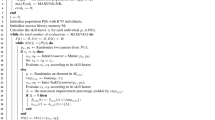Abstract
Multifactorial Evolutionary Algorithm (MFEA) is a popular optimization algorithm in recent years. It has implicit parallelism and can solve different problems at the same time in the same search space. However, premature convergence is a significant shortcoming of MFEA. The main reason for this phenomenon is the lack of population diversity and the inability to migrate effectively between tasks. To address this shortcoming, this paper proposes a cross elitist learning multifactorial evolutionary algorithm (CEL-MFEA). Firstly, the cross elitist strategy guides the individuals to learn from the elite individual, which can improve the convergence of the proposed CEL-MFEA. Secondly, the Nelder-Mead algorithm is used to provide an effective knowledge transfer between different tasks. Finally, the opposition learning mechanism is employed to ensure population diversity. The comprehensive ability of the proposed CEL-MFEA is evaluated by 9 classical multifactorial optimization problem test sets. Experimental results show that the CEL-MFEA is more competitive than MFEA algorithm and several popular multifactorial optimization algorithms.
Access this chapter
Tax calculation will be finalised at checkout
Purchases are for personal use only
Similar content being viewed by others
References
Back, T., Hammel, U., Schwefel, H.P.: Evolutionary computation: comments on the history and current state. IEEE Trans. Evol. Comput. 1(1), 3–17 (1997)
Zhu, Y., Tang, X.: Overview of swarm intelligence. In: 2010 International Conference on Computer Application and System Modeling (ICCASM 2010), vol. 9, pp. V9–400-V9–403. IEEE(2010)
Tan, K.C., Chew, Y.H., Lee, L.H.: A hybrid multiobjective evolutionary algorithm for solving vehicle routing problem with time windows. Comput. Optim. Appl. 34(1), 115–151 (2006)
Guo, S.M., Yang, C.C.: Enhancing differential evolution utilizing eigenvector-based crossover operator. IEEE Trans. Evol. Comput. 19(1), 31–49 (2014)
Asafuddoula, M., Ray, T., Sarker, R.: A decomposition-based evolutionary algorithm for many objective optimization. IEEE Trans. Evol. Comput. 19(3), 445–460 (2014)
Gupta, A., Ong, Y.S., Feng, L.: Multifactorial evolution: toward evolutionary multitasking. IEEE Trans. Evol. Comput. 20(3), 343–357 (2015)
Yi, J., Bai, J., He, H., et al.: A multifactorial evolutionary algorithm for multitasking under interval uncertainties. IEEE Trans. Evol. Comput. 24(5), 908–922 (2020)
Gong, D., Geng, N., Zhang, Y.: Robot path planning in environment of many terrains. Control Decis. 27(5), 708–712 (2012)
Binh, H.T.T., Thanh, P.D., Trung, T.B.: Effective multifactorial evolutionary algorithm for solving the cluster shortest path tree problem. In: 2018 IEEE Congress on Evolutionary Computation (CEC), pp. 1–8. IEEE (2018)
Yin, J., Zhu, A., Zhu, Z., et al.: Multifactorial evolutionary algorithm enhanced with cross-task search direction. In: 2019 IEEE Congress on Evolutionary Computation (CEC), pp. 2244–2251. IEEE (2019)
Bali, K.K., Gupta, A., Feng, L., et al.: Linearized domain adaptation in evolutionary multitasking. In: 2017 IEEE Congress on Evolutionary Computation (CEC), pp. 1295–1302. IEEE (2017)
Feng, L., Zhou, W., Zhou, L., et al.: An empirical study of multifactorial PSO and multifactorial DE. In: 2017 IEEE Congress on Evolutionary Computation (CEC), pp. 921–928. IEEE (2017)
Da, B., Ong, Y.S., Feng, L., et al.: Evolutionary multitasking for single-objective continuous optimization: Benchmark problems, performance metric, and baseline results. ar**v preprint ar**v:1706.03470 (2017)
Zhou, L., Feng, L., Tan, K.C., et al.: Toward adaptive knowledge transfer in multifactorial evolutionary computation. IEEE Trans. Cybern. 51(5), 2563–2576 (2020)
Tang, Z., Gong, M., Wu, Y., et al.: A multifactorial optimization framework based on adaptive intertask coordinate system. IEEE Trans. Cybern. (2021)
Lagarias, J.C., Reeds, J.A., Wright, M.H., et al.: Convergence properties of the Nelder-Mead simplex method in low dimensions. SIAM J. Optim. 9(1), 112–147 (1998)
Tizhoosh, H.R.: Opposition-based learning: a new scheme for machine intelligence. In: International Conference on Computational Intelligence for Modelling, Control and Automation and International Conference on Intelligent Agents, Web Technologies and Internet Commerce (CIMCA-IAWTIC 2006), vol. 1, pp. 695–701(2005)
Piotrowski, A.P.: Adaptive memetic differential evolution with global and local neighborhood-based mutation operators. Inf. Sci. 241, 164–194 (2013)
Acknowledgments
This research is partly supported by the National Natural Science Foundation of China under Project Code (62176146, 61773314).
Author information
Authors and Affiliations
Editor information
Editors and Affiliations
Rights and permissions
Copyright information
© 2022 The Author(s), under exclusive license to Springer Nature Singapore Pte Ltd.
About this paper
Cite this paper
Li, W., Luo, H., Wang, L. (2022). Cross Elitist Learning Multifactorial Evolutionary Algorithm. In: Zhang, H., et al. Neural Computing for Advanced Applications. NCAA 2022. Communications in Computer and Information Science, vol 1637. Springer, Singapore. https://doi.org/10.1007/978-981-19-6142-7_2
Download citation
DOI: https://doi.org/10.1007/978-981-19-6142-7_2
Published:
Publisher Name: Springer, Singapore
Print ISBN: 978-981-19-6141-0
Online ISBN: 978-981-19-6142-7
eBook Packages: Computer ScienceComputer Science (R0)




